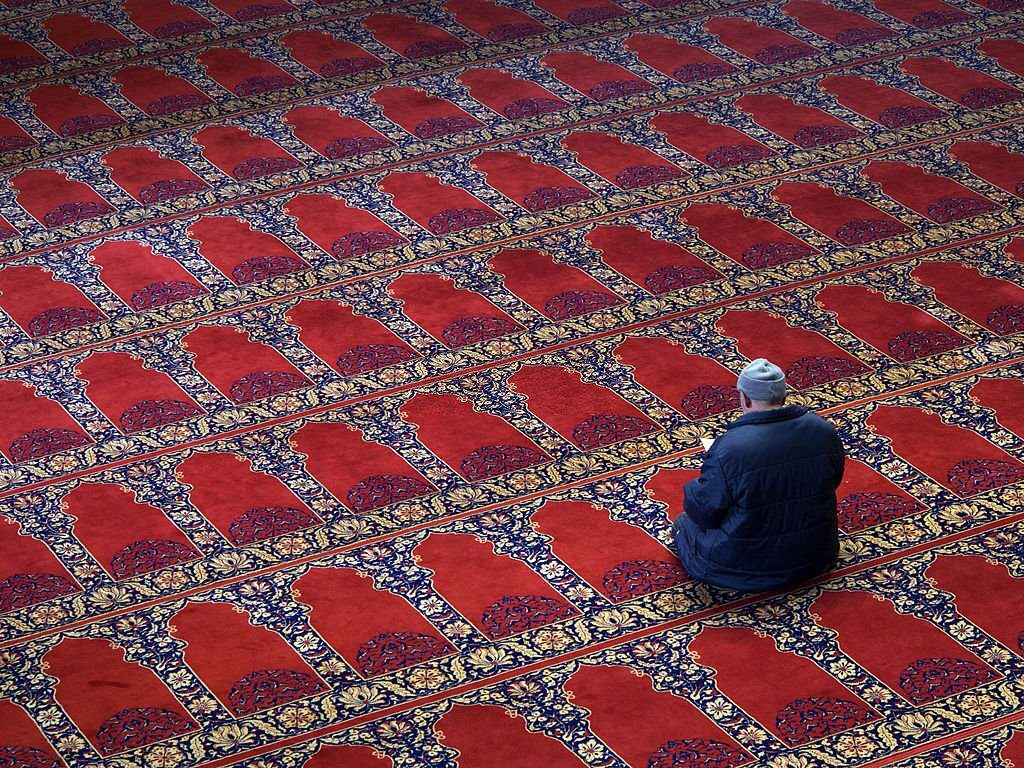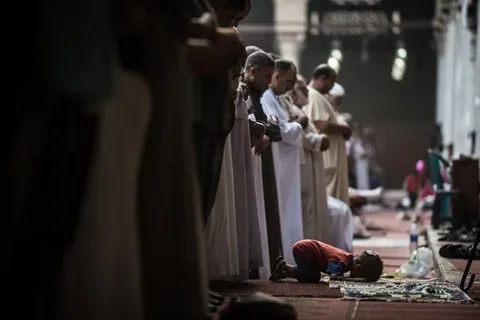We begin by praising Allah subhanahu wa ta’ala and bearing witness that none has the right to be worshipped or unconditionally obeyed except for Him. And we bear witness that Muhammad sallallahu alayhi wasallam is His final messenger. We ask Allah to send His peace and blessings upon him, the prophets and messengers that came before him, his family and companions that served alongside him, and those that follow in his blessed path until the Day of Judgment. And we ask Allah to make us amongst them. Allahumma ameen.
The Mindset of Being at the Right Place at the Right Time
Dear brothers and sisters, rather than talking about the month of Sha’ban and its virtues as we have entered into it, I wanted to address an attitude that Allah subhanahu wa ta’ala sees in some of His servants. This attitude particularly comes out in the month of Sha’ban and other times that people neglect. So, this isn’t a khutbah just about Sha’ban, but about a particular mindset of being at the right place at the right time and what that means in terms of your relationship with Allah subhanahu wa ta’ala.
Being at the right place at the right time—here you are, masha’Allah, in Salatul Jumu’ah. May Allah subhanahu wa ta’ala accept it from each and every single person that is here. It is the right place and the right time. But I want to begin with this idea of a business deal. If a person is able to capitalize on a great opportunity from a worldly perspective, and indeed Allah subhanahu wa ta’ala Himself compares something as routine as Salatul Jumu’ah to a deal that is available to you—a deal that many people will not avail themselves of—when Allah azawajal compares those that pursue tijara (those that pursue a great business deal) versus those that pursue a great spiritual deal by coming to Salatul Jumu’ah.
Success is Not an Accident
You see someone that entered into a particular market at a particular time, and they struck gold. They got in right at the beginning of a new trend. Everyone is trying to jump onto this trend now and buy into the stock. Everyone’s trying to buy this particular type of business. Everyone’s trying to invest now, and you have those that got there first, and they dominate the market share. And I want you to think about this because a lot of times, people will say they just happen to be at the right place at the right time. They struck at the right time. But the reality is that success is never an accident, or at least it rarely is. Sometimes there are people, subhanAllah, who make every bad decision, and then something happens for them, and they get in. But for most people, success is not an accident because, at the bare minimum, those people were paying attention to things that other people were not. Maybe they were just watching trends. Maybe they were reading articles obsessively. Maybe they were asking a lot of questions that people were not asking, but they had an added alertness to them, an added level of attentiveness that allowed them to be at the right place at the right time to gain something from a worldly perspective that they continue to reap the benefits of.
The Mercy of Allah: Knowing His Times and Places
Now, here’s the thing about the right place and the right time with Allah subhanahu wa’ta’ala. Imam Ibn Al-Qayyim says that from the mercy of Allah subhanahu wa’ta’ala is that He has made His times and His places known to you. He’s made His time and His places known to you. You know exactly when the best times are. You know the window that you need to be present. You know the place that you need to be present. You know the reward of coming earlier. You know the reward of doing more. Allah, in His excellence to you, in His ihsan to you, doesn’t leave you guessing. He gives you very limited windows and times that have unlimited mercy in terms of their potential. And the most in terms of variance you’re going to see is, for example, the last ten nights of Ramadan. But I think we can all agree that for a lifetime of good deeds, having ten nights to exert ourselves in is a pretty good deal with Allah subhanahu wa’ta’ala.
So, from the mercy of Allah is that He lets you know what His places are and what His times are, leaving to you only the decision to show up, to be present. And there’s an element of coming early, and there’s an element of being present. Coming early—you know, if you think of Sha’ban like practice and Ramadan like the game, all right? If you don’t show up to practice, eventually, that lack of practice is going to show up in the game as well. The lack of coordination, something is going to go wrong. The talent will give out. The equivalent of the talent might be your natural spirituality. Maybe you’re a person who immediately gets into the zone in Ramadan. You read Quran right away, you get into the salah, you immediately embrace tarawih. But eventually, the faultiness of you not having used the month of practice will show up—a lack of coordination at the bare minimum. So, there is getting early, and there’s being present.
The Tazkiyah Checklist: Excellence in Worship
Now, I wanted to give this a tazkiyah checklist, if you will. What does Ihsan look like? What does excellence look like when it comes to showing up at the right time at the right place? There are four things:
- Doing while others are not doing.
- Doing what isn’t expected of you in your circumstances.
- Doing more of what everybody else is doing.
- Doing quicker and with more enthusiasm what everybody else is doing.
So, I’m going to break these down, inshallah ta’ala, but I wanted to give you the list of four things from the very beginning. What does it mean to have your time to shine in the sight of Allah subhanahu wa’ta’ala? And where does Sha’ban fall into this in terms of an attitude?
The first one is doing while others are not doing.
And I’m going to use the ibadat, the acts of worship that are very familiar to us—prayer. The Prophet sallallahu alayhi wa sallam specifically said, “Sallu bil layli wal nasu niyam”—pray at night while other people sleep. It’s expected that people are going to pray five times a day, but when everybody else is sleeping, you have an opportunity to wake up and to pray and to distinguish yourself. And subhanAllah, you can imagine that at one point on the face of this earth, there were three people that were praying qiyam al-layl: the Prophet sallallahu alayhi wa sallam, his wife Khadija radiyallahu anha, and then his son-in-law Ali ibn Abi Talib radiyallahu ta’ala anhu. This is a famous narration.
At one point on earth, imagine the angels going around that night looking for the people praying qiyam. There is only one household in the entire world that was reading the Quran at night. But now that it’s all available to us, who are the people that wake up and pray while other people sleep? Who are the people that give when other people withhold? Right, so there are moments of charity—avenues where people will give of their time, give of their wealth, while other people withhold. And so they shine in the sight of Allah subhanahu wa’ta’ala because they literally—if you think about good deeds lighting up a room—there are people there that shine, right? As those that stand out from the rest and what they’re willing to give of their volunteerism, of what they’re willing to do in terms of their time and their wealth. Right, because when Adam alayhi salam, as the scholars mentioned, looked at his children, there were lights that were shining. One of them being the Prophet David, Dawood alayhi salam. He was a shining light shimmering in the darkness.
So, your time to shine is giving when other people withhold. Your time to shine is fasting when other people don’t traditionally fast. And subhanAllah, you’ll find a connection with all three of these things—the prophets I mentioned, the angels celebrating the household where someone is awake at night while other people are sleeping. The angels even calling from the gates of heaven to the one that is giving, saying, “Allahumma a’ti munfiqan khalafa”—Oh Allah, give to the one who gave. And he said sallallahu alayhi wa sallam in another narration of Tirmidhi that when someone fasts while other people are eating around them—this is not talking about Ramadan per se, right? Usually, this is talking about a voluntary fast. When someone fasts while other people around them are eating, the angels keep on praying on that person until they finish their food. So, they’re getting their share of nutrition. You’re getting your share of prayers from the angels upon you. Why? Because you’re shining in that place. You’re the one person that’s fasting there, and the angels recognize that, and Allah subhanahu wa’ta’ala sends the angels to give that a special recognition.
So, that’s doing while other people are not doing.
The second one is doing what isn’t expected of you in your circumstances.
So, giving—even when you fear poverty. The Prophet sallallahu alayhi wa sallam said, so beloved to Allah subhanahu wa’ta’ala, you forgive even when you’re not expected to forgive. You pull back from an argument even when you have every right to get into an argument. “Taraka al mira’a wa in kana muhiqqan”—it’s all right, let it go. You do what’s not expected of you in your circumstances. Allah azawajal looks at that, and Allah subhanahu wa’ta’ala mentions, “Wallahu yuhibbul muhsineen”—Allah loves those people. Right, they do even what’s not expected of them. So, they shine there. No one expected you to give at that point. No one expected you to forgive. No one expected you to exert yourself, but Allah subhanahu wa’ta’ala saw what you did there.
The third thing is doing more of what others are doing.
So, this is a quantitative element of shining. Everybody’s doing the same thing, but some people are doing more of it. Okay, so when it comes to prayer, there are nawafil, there are voluntary prayers. The gate of salah to paradise—the gate of prayer to paradise—is not meant for those who pray five times a day. You know, particularly, it’s for those who add to that, right? They do more of it. Those who will enter through baab al rayyan are not just the people that fast in Ramadan. The gate of rayyan of paradise is the gate of fasting. It’s for those people that especially fast. So, everybody fasts, but they fast more, right? So, they have a specific gate that’s not just for people of Ramadan. Or those that give extra charity—baab al sadaqa, the gate of charity to al jannah, is not the gate of zakah. It’s not just the gate of paying your mandatory charity. It’s those people that give extra charity and they exert themselves. So, doing more of what everybody else is doing.
And the fourth one is doing quicker and with more enthusiasm what others are doing.
So, it has a qualitative element to it—a qualitative element to it. Part of that is the hastening to what others are lazy towards. So, I give people the spectrum, right? Or not me giving it—we find it from the Prophet sallallahu alayhi wa sallam’s prayer to the prayer of the hypocrites. The Prophet sallallahu alayhi wa sallam was described that when the time of prayer came, “Wathaba”—he jumped up like a lion, sallallahu alayhi wa sallam. I mean, he jumped out of his bed. Aisha radiallahu anha saying that he was so present at home, but once the call for prayer happens, as if he didn’t even know us anymore, sallallahu alayhi wa sallam. Enthusiastic, so ready for the prayer at all times—like the adhan immediately triggered that response, a very predictable response from the Prophet sallallahu alayhi wa sallam. That’s wathaba. Now, in the same prayer, there are the hypocrites. But “Qamu qusala”—when they got up for prayer, got up so lazy, wudu was improper, pulled themselves to it. They dragged their feet to it. All of us are somewhere between wathaba and qamu qusala—somewhere in that spectrum, we fall between jumping up like the Prophet sallallahu alayhi wa sallam and dragging our feet like a hypocrite—may Allah protect us from hypocrisy and allow us to strive to be more like our Prophet sallallahu alayhi wa sallam. So, it’s a qualitative element too, and Allah sees that. Allah sees the prepared heart. Allah sees that excitement from a person.
The Prophet sallallahu alayhi wa sallam mentioning within the jama’a, he said sallallahu alayhi wa sallam,
“Lau ya’lamuna maa fi al-saffi al-awwal la kaanit qur’a”—if they knew the blessing of the first row, they would have cast lots for it. If they knew what it meant to be from ashab al-saffi al-awwal—may Allah subhanahu wa’ta’ala allow us to strive to be from ashab al-saffi al-awwal, the people of the first row. Allahumma ameen. And that doesn’t mean jumping over people and getting to the first row. That means getting early to the salah—something we can strive for.
There’s a qualitative element to that and being there quickly, looking for Allah subhanahu wa’ta’ala. And there are so many examples—Salat al-jumu’ah being one of them. The Prophet sallallahu alayhi wa sallam saying the one who came in the first hour, then the one who came in the second hour, than the one who came in the third hour—and he’s paralleling to that a specific reward. So, those that came first got the greater reward, those that came second got the lesser reward, and so on and so forth.
The Significance of Sha’ban: A Time to Shine
Now, what does this have to do with Sha’ban—the month of Sha’ban? And I said at the outset for a reason. Just like Ramadan, by the way, appeals to a particular heart, Sha’ban appeals to a particular mindset. Usama ibn Zaid radiallahu ta’ala anhu narrates, as well as Aisha radiallahu ta’ala anha, that there was no month that we would see the Prophet sallallahu alayhi wa sallam fasting outside of Ramadan as much as Sha’ban. It was as if he was connecting them, sallallahu alayhi wa sallam. You know, they say that a perfect practice is the closest you’ll get to a perfect performance. Right? Like, to see him sallallahu alayhi wa sallam fasting all of Sha’ban to a point that you could count on one hand perhaps what the Prophet sallallahu alayhi wa sallam might not have fasted in the month of Sha’ban is inspiring. But here’s the thing—there’s not a single khutbah where the Prophet sallallahu alayhi wa sallam is pushing the community to it the way that he was fasting at sallallahu alayhi wa sallam.
Here’s where the narration continues, and it gets very interesting. They asked the Prophet sallallahu alayhi wa sallam, and he said,
“Dhalika shahr yaghfulu anhu an-nas bayna Rajab wa Ramadan”—that’s a month that people become heedless in regards to; they neglect it because it’s between the sacred month of Rajab and the greatest month of Ramadan. So, people toss it to the side. And he said sallallahu alayhi wa sallam, “Turfa’u fihi al-a’malu ila rabbil ‘alameen, fa uhibbu an turfa’a ‘amali wa ana sa’im”—and also, the deeds are presented to Allah in this month, and I like that my deeds are presented to Allah when I’m in a state of fasting.
But the first reason he gives sallallahu alayhi wa sallam is the interesting one—the particular one of this khutbah. It’s a time of ghafla. It’s actually a time of heedlessness. It’s a time where most people are not taking their particular journey to Allah subhanahu wa ta’ala that seriously. It’s a time that you rarely find people exerting themselves in these good deeds. And the Prophet sallallahu alayhi wa sallam is saying that’s the best time to shine. That’s the best time to stand out when other people aren’t paying attention. That’s when you pay extra attention because you stand out amongst the crowd at that point.
The Repulsiveness of Heedlessness
And Abu Bakr al-Razi Rahimahullah commented,
“Qala ma aqbaha al-ghafla ‘an ta’ati man la yaghfulu ‘an birrik, wa ma aqbaha al-ghafla ‘an dhikri man la yaghfulu ‘an dhikrik”—he said, “Ma aqbaha al-ghafla”—how repulsive is heedlessness—“‘an ta’ati man la yaghfulu ‘an birrik”—a person who becomes heedless in regards to the worship of the one who never stops showing you kindness. And he said, “Wa ma aqbaha al-ghafla ‘an dhikri man la yaghfulu ‘an dhikrik”—how repulsive is heedlessness in regards to remembering the one who never forgets you.
Ghafla can be sinful—heedlessness can be sinful—and sometimes it can just be complacency. But what we should be doing in this month is competing for Allah’s pleasure when most people are not even paying attention to it. And that’s something you have to ask yourself—how can I push myself to do something that other people are waiting for Ramadan to do?
How do I exert myself now as practice for Ramadan? But also, in honoring a particular time that other people are not honoring, as Ibn Al-Jawzi said, Ramadan is a time where everyone does Ibadah, but your Ibadah in Sha’ban is a time where you really show that you want the Rida of Allah—you want the pleasure of your Lord. And this was a mindset of the Companions.
So, for example, one of the narrations—some of the Companions,
“Kanoo yastahibboona ihyaa ma bayna al-‘ishaa’ayn bil salah”—they used to love to worship between the two Isha’as, the two night prayers.
What are the two night prayers? Maghrib and Isha’a—hadith literature. So, they would stay in the Masjid between Maghrib and Isha’a—this group of Companions. They said, most people go home and come back for Isha’a. Let’s see if we can take advantage of this time. And the Prophet ﷺ coming out so proud of those young men that came to the Masjid and they stayed between Maghrib and Isha’a, worshipping Allah subhanahu wa’ta’ala until the next Salah because they said that’s a time where people become heedless. That’s my time to shine.
The Du’a of the Marketplace
When you go to the marketplace, the best du’a that you can find—or one of the best du’as—is du’a al-suq, the du’a of the marketplace. Why? Because most people are not thinking about supplication when they walk into the marketplace. Try it next time you go on amazon.com. Right? Your mind is in a different place when you start looking at things, and you’re shopping, and for you to remember Allah at that point—here’s a million good deeds for you instead of whatever it is that you’re gonna get from this particular shopping.
The dua of the marketplace is mentioned in the hadith in which the Prophet (blessings and peace of Allah be upon him) said:
“Whoever enters the marketplace and says ‘La ilaha ill-Allahu wahdahu la sharika lahu, lahu’l-mulku wa lahu’l-hamdu, yuhyi wa yumit wa huwa hayyun la yamut, bi yadihi’l-khayr, wa huwa ‘ala kulli shay’in qadir (There is no god but Allah Alone, with no partner or associate; to Him belongs sovereignty and to Him be all praise; He grants life and causes death, and He is ever-living and will never die; in His Hand is all goodness and He has power over all things),’ Allah will record for him one thousand thousand good deeds, and will erase from his record one thousand thousand bad deeds, and will raise him one thousand thousand degrees.”. (Narrated by at-Tirmidhi in as-Sunan, 3428)
Now, the Quran in particular—Ramadan is shahrul quran. Ramadan is the month of Quran, but do you know what the tabi’een, what the righteous generation used to call Sha’ban? They used to call it shahrul qurra, the month of the reciters. So, they called shahrul Ramadan, shahrul quran—the month of Ramadan, the month of Quran—and they called the month of Sha’ban shahrul qurra, the month of the reciters because only the reciters recite in Sha’ban. And if you could practically say to yourself, I expect to recite this much in Ramadan, I’m going to do half of that in Sha’ban, or even a fourth, but I’m going to start carving out this time every day, and I’m going to read this many pages, and in Ramadan, I expect to make this times two, or times whatever. This is your opportunity to shine, and your opportunity to put yourself forward.
The Qualitative Element: Hiding Good Deeds
And finally, as Al-Hafidh Ibn Rajab said, that part of this is also the qualitative element—trying to hide your good deeds, Ihsan, excellence. In Ramadan, everyone is fasting, everyone’s praying—there’s a public virtue here. In Sha’ban, he says that the Sahaba and the Salaf, the righteous predecessors, what they would do is they would try to hide their fasting in Sha’ban. And that’s one of the wisdoms, perhaps, that the narrations about the Prophet ﷺ fasting all of Sha’ban only come from his family. They only come from Aisha, Usama ibn Zaid, and the people that were in his household ﷺ. And so, Ibn Mas’ud radiyaAllahu anhu said, “Idha asbahtum siyaman fa asbihu mudahhaneen”—he said, if you wake up and you’re fasting in Sha’ban, go out looking fresh, have your cologne on, have your perfume on, whatever it is—don’t let people in on it. Because that’s the qualitative element as well, is that I’m trying to shine with some of these secret deeds that only Allah ﷻ will know about. Because these are not times that the public expects certain good deeds of you.
Striving for Allah’s Pleasure
We ask Allah ﷻ to allow us to shine when we do what others are doing, and when we do what no one else is doing. And we ask Allah ﷻ to drive our hearts, our thoughts, our limbs to please Him in Sha’ban, and to please Him in Ramadan, and to attain His special reward in His special times and places, and to never be deprived of His always special mercy. Allahumma ameen.






